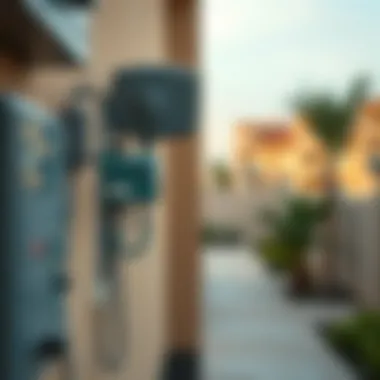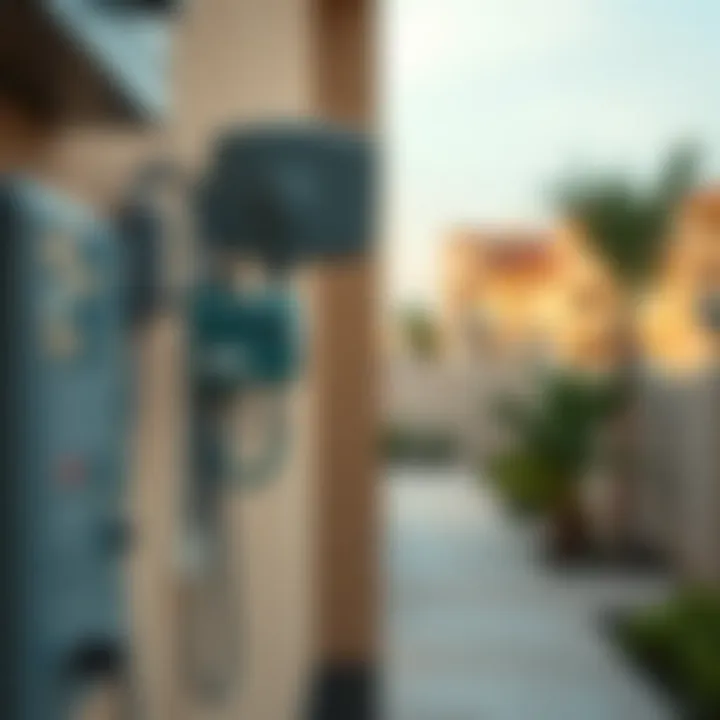Navigating DEWA Connection Procedures in Dubai Real Estate


Intro
Navigating the labyrinth of obtaining a new electricity connection in Dubai can feel like peeling an onion—lots of layers to get through, and it might make you cry if not handled right. With the rapid development of the real estate market, understanding the connection processes with the Dubai Electricity and Water Authority (DEWA) is integral for anyone stepping into the property scene, be it investors, developers, or homeowners.
This guide takes you through the nitty-gritty of how to secure that all-important electricity connection, ensuring you’re well-equipped to tackle any challenges that may pop up along the way.
The process can seem intimidating initially, filled with industry jargon and bureaucratic hoops to jump through. However, being informed about the necessary documents, timelines, and procedures can turn a complicated affair into a smooth transaction. You're in for a real eye-opener—so let’s roll up our sleeves and dive into the details.
Prelims to DEWA New Connection
The initiation of a new connection with the Dubai Electricity and Water Authority (DEWA) plays a pivotal role in shaping the real estate landscape in Dubai. For investors, property developers, and homeowners alike, understanding this process is not merely a procedural step; it is essential for unlocking the potential of their investments. The significance of establishing utility connections extends beyond just provision of energy and water; it influences the overall viability and attractiveness of real estate projects.
Importance of Utility Connections in Real Estate
Utility connections can make or break a real estate venture in Dubai. A seamless connection to water and electricity directly impacts property value and rental appeal. Investors need to grasp that without these crucial links, properties cannot be occupied, rented, or sold swiftly. This is especially pertinent in a market like Dubai, where competition is fierce, and the expectation for modern amenities is high. Furthermore, utility connections foster compliance with regulations, enhancing the credibility of a project. For example:
- Attractiveness to Buyers and Tenants: Properties that are ready for immediate habitation, with all utility connections established, are immensely appealing to potential buyers and tenants.
- Facilitating Immediate Revenue Generation: Investors can start generating income more quickly when utilities are established from the get-go.
- Enhancing Project Viability: Developers who ensure timely connection installations can maintain their project schedules, avoid delays, and ultimately reduce costs associated with extended development periods.
In summary, utility connections are not just safeguards for operational success; they are fundamental to establishing a robust foundation for any real estate investment in Dubai.
Overview of Dubai's Power Infrastructure
Dubai’s power infrastructure is a testament to its rapid growth and modernization. The system is built to cater to the burgeoning population and commercial expansion, with DEWA at the helm, ensuring reliability and sustainability. As one of the leading utility providers in the Middle East, DEWA oversees not only the delivery of electricity but also the management of water resources crucial for a desert landscape.
The structure of Dubai's electricity grid is designed to support ambitious projects, with an eye toward renewable energy. The Smart Dubai initiative integrates sustainability and technological innovations into power management, showcasing Dubai's commitment to a greener future. Key aspects include:
- Diverse Energy Sources: The grid incorporates various energy sources such as solar, gas, and even nuclear power, demonstrating resilience against fluctuating market conditions.
- Advanced Metering: Smart meters are deployed extensively, giving consumers real-time data to manage their energy consumption effectively.
- Robust Distribution Network: A well-structured network minimizes outages and assures that customers receive uninterrupted service, an essential aspect for businesses operating in a fast-paced environment.
With this infrastructure, DEWA ensures that whether you're developing a high-rise in Downtown Dubai or a suburban villa in Arabian Ranches, your power needs are met effectively and efficiently. The challenge lies in navigating the application processes for these connections, a topic we will explore in depth in the following sections.
Understanding DEWA
To truly grasp the essence of securing a new electricity connection in Dubai, one must first delve into the mechanisms of the Dubai Electricity and Water Authority, commonly known as DEWA. Understanding DEWA is pivotal, not just for the procedural aspects but also for navigating the broader implications it holds for property investors, developers, and homeowners. Insight into DEWA’s foundation enables stakeholders to approach the connection process with clarity, transforming what could be a daunting task into a manageable operation.
History and Background
Established in 1992, DEWA emerged as a response to the staggering growth witnessed in Dubai throughout the late 20th century. Initially formed to cater to the rising demand for electricity and water, it has consistently evolved, matching Dubai’s rapid urbanization and expansion. Back in the early days, DEWA focused mainly on basic electricity supply, but as the city transformed into a global hub, the authority adopted more sophisticated technologies and services.
Since its inception, DEWA has made considerable strides. For instance, in 2009, it launched a vision to provide sustainable energy solutions, which aligns perfectly with the United Arab Emirates’ strategy for environmentally friendly development. This initiative underscored DEWA’s commitment not just to supply but also to the necessity of integrating a sustainable approach in all its operations. A key milestone in DEWA’s timeline includes the establishment of the Mohammed bin Rashid Al Maktoum Solar Park, aiming to produce clean energy and reduce dependence on fossil fuels.
Role of DEWA in Dubai’s Growth
DEWA stands as a backbone to Dubai’s thriving economy; without it, the city’s landscape would look quite different. The role played by DEWA transcends mere electricity and water provision. In a city where skyscrapers touch clouds and developments are relentlessly moving forward, DEWA ensures that energy supply supports every innovation, construction, and eventual residential settlement.
The authority is often termed a key player in Dubai’s strategic growth initiatives. As Dubai positions itself as a competitive global city, DEWA’s existence ensures that all developments, from luxury high-rises to bustling commercial districts, have reliable and consistent utilities.
"A city without stable utilities is like a ship without a rudder — it simply cannot navigate the turbulent waters of growth."
From developing infrastructure to ensure energy efficiency to promoting customer-oriented services, DEWA has set benchmarks in the utility sector. Notably, its role in supporting major international events, like Expo 2020, showcased its pivotal position in illuminating Dubai’s future. It's essential for investors and homeowners to recognize that aligning their expectations about utility connections involves understanding DEWA's part in facilitating these vibrant city growths.
In summary, knowing the history and role of DEWA not only aids in the practical aspects of securing a utility connection but also provides investors and developers with invaluable context to appreciate the infrastructural triumphs of Dubai.
Application Process for New Connection
Securing a new electricity connection through the Dubai Electricity and Water Authority (DEWA) is no walk in the park. It's a process that entails various essential steps that every property developer, investor, or homeowner in Dubai must grasp. The importance of understanding this application process cannot be understated, as it directly influences how swiftly and efficiently your property can become operational.
The application process serves as the crucial gateway between your property plans and the essential utilities. Whether you're looking to build a luxury villa or a high-rise apartment, the reliability of having power connected in a timely manner can significantly impact project timelines and costs.
Pre-application Requirements
Before diving headfirst into the application, it's vital to get your ducks in a row. DEWA mandates a few requirements prior to submission, designed to better prepare applicants for the journey ahead.


- Proof of Ownership: You will need to provide evidence of ownership or a rental agreement, ensuring that the property in question is indeed yours, or that you have permission to apply for utility services.
- Land Area and Layout Plans: It's not enough to say you have a property; you need a site plan that outlines the intended layout, including the size of the land and the structure's dimensions.
- Structural Approval: Any new construction should have prior approval from the relevant authorities, which ensures that all safety and structural regulations are met.
Once you’ve gathered these crucial documents, you're better poised to make your application. Having everything ready means you're less likely to experience delay, catching the eye of anyone who might initially think about raising an eyebrow during the review process.
Submitting the Application
Now that you have your documentation set, it's time to hit send…well, sort of. You have a couple of options for submission, and understanding them can save you time and hassle.
- Online Portal: The easiest way may just be the most modern. DEWA provides an online portal where you can fill out your application and upload all required documents. This method offers convenience and allows you to monitor your application status.
- In-person Submission: If you prefer a more traditional route, you can always drop by a DEWA customer service center. This allows direct interaction with officials who can answer immediate concerns or confusion at that moment.
It's essential to double-check all entries in your application. Any tiny detail—like a wrong spelling or an incorrect number—might derail the entire process, leaving you scratching your head while your project waits.
Follow-Up Procedures
So, you’ve submitted your application. Now what? It’s tempting to sit back and await the call, but being proactive can expedite matters. Knowing how to follow up is crucial.
- Check Application Status: After a few days, log back into the DEWA online portal or make a quick call to their customer service. Regular follow-ups not only keep you informed but also show DEWA that you are keen on the process.
- Clarifying Queries: If there are any queries or documentation requests from DEWA, be prompt in your response. Delaying may lead to extra waiting time.
- Maintain Open Communication: Keeping lines open with DEWA representatives can sometimes help bypass small hiccups. A quick chat may clear misunderstandings faster than long waits for written correspondence.
"Adequate follow-up can often be the game-changer in ensuring timely project execution."
Navigating the application process for a new electricity connection might seem like navigating a maze. However, understanding each aspect—what to prepare, how to submit, and what it takes to follow up—can effectively streamline your path to securing dependable utilities for your property in Dubai.
Necessary Documentation
In navigating the new connection processes for electricity with the Dubai Electricity and Water Authority (DEWA), having the right documentation is like having a key to unlock the door to your desired utilities. Without the necessary paperwork, the entire process can hit a snag. This section elucidates on the essential documents that homeowners and developers must prepare, thereby streamlining the application process and preventing unforeseen delays.
When engaging in real estate transactions in Dubai, understanding the documentation requirements is critical. Not only does it facilitate a swift connection process, but also ensures compliance with DEWA regulations. Having the correct documents ready can save investors and buyers both time and money down the road, so it’s not just about having the right info but knowing how it plays into the larger picture of the real estate landscape in Dubai.
Documents for Homeowners
For homeowners applying for a new connection, the documentation can seem daunting at first glance. However, understanding what's required is half the battle won. Here’s a breakdown of essential documents that homeowners should prepare:
- Copy of Emirates ID: This serves as proof of identity and residency in Dubai.
- Property Title Deed: Essential for confirming ownership of the property. Buyers should ensure that this document is legitimate and registered with the relevant authorities.
- No Objection Certificate (NOC): Depending on your community or building management, an NOC might be required to establish that they have no objections regarding the new connection.
- Site Plan: This reflects the property layout and helps DEWA in assessing connection points effectively.
- Completion Certificate: If the property is newly constructed, ensure to present this certificate as a proof that the essential building standards have been met.
"The right documents can fast-track your connection process with DEWA, alleviating the frustration often associated with utility setups."
Being proactive in preparing these documents can significantly reduce the back-and-forth between the homeowners and DEWA. Taking the time to cross-check each document against DEWA’s requirements ensures a smoother experience, avoiding potential roadblocks when the application is submitted.
Documentation for Developers
Property developers, tasked with larger projects, often face more complex documentation requirements. Their approach must align with both local regulations and DEWA’s standards. Here’s what developers typically need to gather:
- Company Trade License: This proves that the developer is a registered entity authorized to operate in Dubai and undertake construction works.
- Power of Attorney (if applicable): If someone is acting on behalf of the developer, this legal document is crucial to authorize their actions.
- Project Permit and Approval: Evidence of regulatory approvals from relevant authorities that the development project is underway.
- Design Drawings: These provide a detailed overview of the planned electricity layout, essential for DEWA’s review and planning purposes.
- Environmental Impact Assessment (EIA): Depending on the scale of the project, an EIA might be necessary to assess the implications of the development.
By gathering the proper documents, developers can not only facilitate their connection process but also uphold the integrity of the building projects.
Ensuring that all documentation is organized and readily available can make a world of difference when dealing with the complexities of obtaining new connections in the bustling Dubai real estate market.
Timelines and Costs Involved
Understanding the timelines and costs associated with obtaining a new electricity connection from Dubai Electricity and Water Authority (DEWA) is crucial for all stakeholders in the Dubai real estate market. Both timeframe and cost can significantly influence investment decisions and development plans. For developers and homeowners alike, having a clear grasp of these factors helps in budgeting and scheduling projects more effectively.
Typical Timeframes for Connection
Securing a new connection isn’t always a walk in the park. The timeline for obtaining a new electricity connection in Dubai can vary significantly depending on several factors such as the type of property, the location, and the completeness of submitted documentation. Generally, the process can take anywhere from a few weeks to a couple of months.
- Initial Application Handling:
- Site Inspection Scheduling:
- Final Approval for Connection:
- Upon submission, DEWA reviews the application. If everything is in order, initial feedback can take about 5-10 business days.
- Following the approval, a site inspection may be conducted, which can take up to 2 weeks to schedule.


- Once inspections are complete, DEWA typically provides final approval within 10-15 business days.
In light of these stages, it's wise for property buyers and developers to factor in possible delays.
Investing time in ensuring all documents are comprehensive and precise from the get-go can shave a few days off this timeline.
Cost Estimates for Various Connection Types
When it comes to costs, prospective clients must also navigate a maze of potential fees associated with DEWA connections. These costs can fluctuate based on property type, location, and estimated consumption demands. Here’s a breakdown:
- Residential Properties:
- Commercial Properties:
- High-Rise Buildings and Complex Developments:
- For standard residential buildings, connection fees typically range around AED 1,000 to AED 3,000 depending on the load demanded.
- As for commercial setups, expect costs from AED 5,000 to AED 15,000, influenced heavily by the size and operational needs of the business.
- Larger-scale developments might face connection costs that reach AED 20,000 and above, with additional charges for infrastructure enhancements, if required.
Understanding these costs ahead of time allows investors to prepare comprehensive budgets and potentially avoid unforeseen expenses that can arise during the project life cycle. Furthermore, staying informed on current rates can assist in effective financial planning, ensuring that funds are allocated efficiently.
Challenges in Securing a New Connection
When stepping into Dubai's dynamic real estate scene, one cannot overlook the pivotal role of establishing a new electricity connection with the Dubai Electricity and Water Authority (DEWA). This isn't just a mere formality; it can be the difference between a flourishing investment and a prolonged delay. Recognizing the challenges associated with this process is key for investors, buyers, and property managers who need to navigate the waters carefully.
The importance of understanding these challenges lies in their potential impact on project timelines and costs. The last thing any property developer wants is to face unforeseen hitches during the connection procedure. By being well-informed, individuals can not only anticipate but also mitigate these challenges effectively.
Common Issues Faced
Investors often encounter various obstacles that can complicate the new connection process with DEWA. One such issue arises from incomplete documentation. Missing a single form can stall the entire application, leading to frustrations and delays. Additionally, the technical requirements set forth by DEWA must be adhered to rigorously. Failure to meet these can result in additional scrutiny or outright rejection of applications.
Another prevalent hurdle is the waiting time associated with inspections and approvals. Initial application delays can cascade into longer timelines for project completion.
- Incomplete Documentation: This is perhaps the most common issue, where applicants fail to submit all necessary paperwork, leading to rejection or hold-ups in processing.
- Technical Compliance: Each connection request must meet DEWA’s stringent technical standards. Failure to adhere can result in extra costs or complications.
- Inspection Delays: Inspections are crucial to the process, but they can sometimes take longer than expected, delaying the entire timeline.
Resolving Connection Disputes
Disputes, though challenging, can be resolved through effective communication and a thorough understanding of the policies laid out by DEWA. When faced with issues such as service denial or billing discrepancies, it is essential to adopt a proactive approach.
First and foremost, staying in close contact with DEWA representatives can clarify misunderstandings and provide resolutions. Furthermore, gathering and maintaining comprehensive records of all correspondence and documentation is beneficial. This approach is crucial as it provides a trail of communication, which might be needed should disputes escalate.
To resolve any disputes, the following steps can be undertaken:
- Open Communication: Reaching out directly to DEWA can provide immediate clarification and possible solutions.
- Documentation Review: Ensure all submitted materials are accurate and complete to avoid local disputes.
- Follow-Up: Persistence is key; regular check-ins can keep your application or concern on DEWA's radar.
- Mediation: If direct communication fails, seeking third-party mediation might be effective, drawing on legal or industry expertise.
The art of navigating disputes often lies in your ability to face them head-on and engage with the right stakeholders to find viable solutions.
In summary, understanding and addressing the challenges in securing a new connection with DEWA is paramount for anyone engaging with Dubai’s real estate market. With careful preparation and responsiveness, many potential issues can be transformed into manageable tasks.
Optimization Strategies
In the fast-paced and often intricate realm of Dubai's real estate market, optimizing the process of acquiring a new electricity connection from the Dubai Electricity and Water Authority (DEWA) is crucial. Efficient strategies not only speed up the application process but also minimize potential hiccups that can arise at any stage. These strategies encompass effective communication, understanding regulatory frameworks, and leveraging technological innovations to ensure a seamless experience.
Effective Communication with DEWA
A straightforward dialogue with DEWA can make all the difference when securing a new connection. Here are a few key aspects to consider in this regard:
- Select the Right Channels: Connecting via the official DEWA website, customer service hotlines, or dedicated DEWA app simplifies inquiries. These platforms are designed for straightforward communication, minimizing chances for miscommunication.
- Stay Informed: It’s vital to possess a solid understanding of DEWA’s requirements and policies. Regular updates on the DEWA website help keep stakeholders in the loop regarding any changes.
- In-Person Visits: Sometimes, face-to-face conversation can clarify confusing aspects. DEWA has multiple customer service centers where clients can discuss their specific needs directly with representatives.
- Documentation Preparedness: When reaching out, be ready to present all required documentation. This not only expedites responses but also portrays a proactive approach, signaling your commitment to compliance.
Effective communication lays the groundwork for collaboration, paving the way forward when hurdles arise.
Leveraging Technology for Streamlined Processes


In a city that thrives on innovation, technology plays a pivotal role in optimizing the connection process. Here are some ways technology can aid in streamlining procedures:
- Online Applications and Tracking: The DEWA website and mobile app allow users to submit applications electronically. This convenience reduces the need for physical visits and enhances tracking efficiency, allowing users to easily monitor their application status in real-time.
- Automated Notifications: Opting into notification services provides real-time updates about application progress, required views, and approval statuses. This proactive communication helps users stay ahead, making educated decisions throughout the process.
- Document Management Systems: Utilizing digital tools for managing necessary documentation ensures files are easily accessible, minimizing delays often caused by misplaced or incomplete paperwork.
- Virtual Assistance and Chatbots: Many organizations, including DEWA, employ chatbots on their websites for quick resolution of common queries. This feature allows users to secure instant answers to simple questions, alleviating the demand on customer service representatives and allowing them to focus on more complex issues.
The simple act of integrating these technologies can significantly streamline application procedures, enhancing the overall experience as stakeholders navigate the complex waters of Dubai’s real estate market.
Case Studies
Analyzing real-life case studies offers invaluable insights into the process of securing a new electricity connection through the Dubai Electricity and Water Authority (DEWA). Understanding these examples can help investors, property managers, and homeowners grasp practical implementation, potential obstacles, and success strategies in their own attempts at establishing utility connections.
Successful Connection Experiences
Successful connection experiences highlight what works well when navigating the DEWA connection process. For example, consider the case of a local developer who recently completed several residential units in the heart of Dubai. This developer started the connection application months ahead of the construction's completion, ensuring they had ample time to address any potential challenges.
- Early Engagement: They opened lines of communication with DEWA right from the planning phase, inviting DEWA officials to review the electrical and water supply designs. This proactive approach allowed them to tailor their installation plans according to DEWA's requirements.
- Detailed Documentation: The developer ensured that they submitted all required documents in one go, including architectural drawings, environmental assessments, and proof of ownership. This thorough approach minimized back-and-forth requests, expediting the review process.
- On-Site Coordination: They assigned a dedicated project manager to liaise with DEWA representatives, facilitating clarity and accountability on both sides. Regular meetings kept the project on our toes and aligned with DEWA's processes.
Through these methods, the developer secured a connection for their properties well before the targeted move-in date, illustrating the benefits of meticulous planning and consistent engagement.
Lessons Learned from Rejected Applications
On the flip side, examining rejected applications provides a sobering perspective on what pitfalls to avoid. One recent case involved an investor looking to develop a multi-use building but encountered issues that led to their application being turned away. Key lessons can be drawn from their experience:
- Incomplete Documentation: The investor submitted an application that lacked vital documents, which were crucial for DEWA's evaluation. Missing environmental impact assessments led to project delays and subsequent rejection.
- Failure to Comprehend Requirements: The application attempted to shortcut the approval process by omitting essential elements stipulated by DEWA, like specific design technologies. Not understanding the regulatory framework led to confusion and ultimately rejection.
- Ignoring Feedback: After receiving initial feedback from DEWA, the investor neglected to address the concerns adequately. This lack of responsiveness demonstrated a misunderstanding of DEWA's regulatory priorities.
This experience served as a wake-up call, emphasizing that engagement with DEWA extends beyond submission. It is essential to understand and follow through on all comments and queries received from the authority to foster mutual understanding.
"Learning from both successful and unsuccessful experiences is key to maneuvering effectively in the intricate landscape of Dubai's utility connection processes."
These case studies not only shine a spotlight on the mechanisms at play within DEWA's framework but also serve as a guide for prospective applicants. By understanding successes and setbacks, stakeholders can better navigate their paths toward securing electrical connections in Dubai.
Regulatory Framework Governing DEWA Connections
The regulatory landscape surrounding DEWA connections is crucial to understanding how electricity and water services are delivered in Dubai. These regulations form a backbone that ensures the efficiency, safety, and reliability of utility connections. For investors and property managers, familiarizing themselves with these rules can dramatically smooth the process of securing new utility connections for their projects.
Existing Regulations Impacting New Connections
The current set of regulations that influence new connections to the Dubai Electricity and Water Authority (DEWA) is multi-faceted, balancing operational needs with sustainability goals. DEWA operates under guidelines that reflect both local laws and international standards. Here are some key points:
- Licensing Requirements: All property developers must comply with specific licensing criteria before initiating the connection process. This includes obtaining necessary approvals from local authorities where the property is situated.
- Safety Standards: Adhering to safety standards is non-negotiable. Regulations mandate that all electrical installations must be executed by certified professionals to ensure compliance with DEWA's safety protocols. This helps in minimizing risks associated with electrical faults and ensuring a reliable supply for end-users.
- Environmental Considerations: Regulations also dictate that connections align with Dubai’s long-term vision for sustainability. Projects must demonstrate carbon neutrality or energy efficiency measures. For instance, integrating renewable energy solutions like solar panels can lead to a more streamlined connection approval.
"Understanding the regulatory landscape is not just about compliance; it's also about optimizing connections for future needs, ensuring a viable, long-term utility strategy."
Future Policy Changes and Their Implications
As Dubai embarks on its ambitious goals for the future, potential policy changes are on the horizon that could impact DEWA connections. Stakeholders should closely monitor these developments:
- Increased Emphasis on Smart Technology: With the world leaning towards smart cities, DEWA’s future policies may integrate technology that allows for smarter energy consumption and monitoring. This could lead to more automated application processes and improved efficiency in connection approvals.
- Regulatory Adjustments for Sustainable Practices: More stringent regulations may come into play, encouraging property developers to prioritize sustainable practices. This is crucial as the UAE aims for a greener economy. Projects that can demonstrate compliance with such future directives might find themselves at a competitive advantage.
- Expansion of Scope for Alternative Energy Sources: As Dubai focuses on diversifying its energy portfolio, regulations might adapt to facilitate connections for alternative energy sources like solar and wind. Investors exploring these avenues could face different sets of requirements, thus necessitating a keen understanding of the evolving landscape.
In summary, the regulatory framework governing DEWA connections plays an instrumental role in shaping how new utilities are established in Dubai’s dynamic real estate market. Staying well-informed about existing regulations and emerging policy changes is essential for investors, developers, and property managers aiming to navigate this intricate environment successfully.
Closure
In the intricate landscape of Dubai's real estate market, understanding the processes involved in obtaining a new electricity connection from the Dubai Electricity and Water Authority (DEWA) is not just beneficial but essential. The conclusion of this article encapsulates the myriad elements discussed throughout, emphasizing the significance of navigating utility connections with a strategic mindset.
Summation of Key Points
To sum it up, here are the core takeaways:
- The application process for DEWA connections is detailed, with pre-application requirements, submission protocols, and follow-up procedures being crucial steps.
- Necessary documentation varies for homeowners and developers, and having the right paperwork can make or break an application.
- Understanding the timelines and costs involved offers both transparency and preparedness for property stakeholders.
- Challenges can arise during the connection process, but knowing common issues and resolution strategies can lead to smoother experiences.
- Effective communication and technology can greatly optimize the process.
These points highlight the interconnections between regulatory practices and real estate strategies, making it clear that a comprehensive grasp of the DEWA connection process is foundational for anyone operating in Dubai’s vibrant market.
Future Trends in Dubai’s Utility Connections
Looking ahead, several trends may reshape how new connections are approached in Dubai:
- Increasing Automation: With technology continually advancing, we may see more automated systems within DEWA for applications and approvals, reducing manual workloads and speeding up processes.
- Sustainability Focus: As Dubai pushes for sustainable energy solutions, future connections may pivot towards renewable energy sources. This shift could lead to incentives for properties integrating solar or other eco-friendly energy solutions.
- Enhanced Customer Support Mechanisms: DEWA may introduce more robust support systems, such as digital platforms for customers to track their applications in real-time, resulting in improved user experience and satisfaction.
- Policy Adaptations: Changes in regulations due to global energy influences could result in new frameworks affecting connection processes, possibly streamlining approvals while ensuring compliance with international standards.
As these trends take root, individuals and businesses in Dubai's real estate ecosystem must remain agile and informed. Knowledge about these potential shifts is key, ensuring that investors, buyers, and property managers can adapt their approaches to remain competitive in an ever-evolving market.



